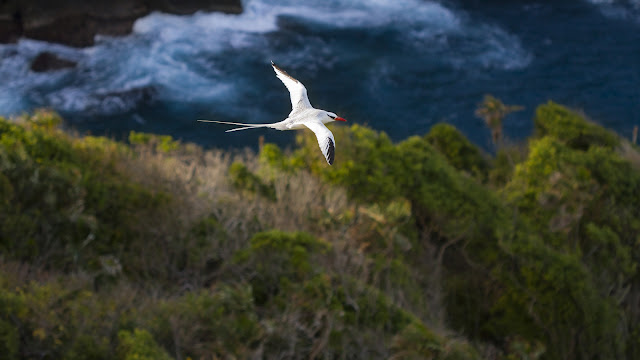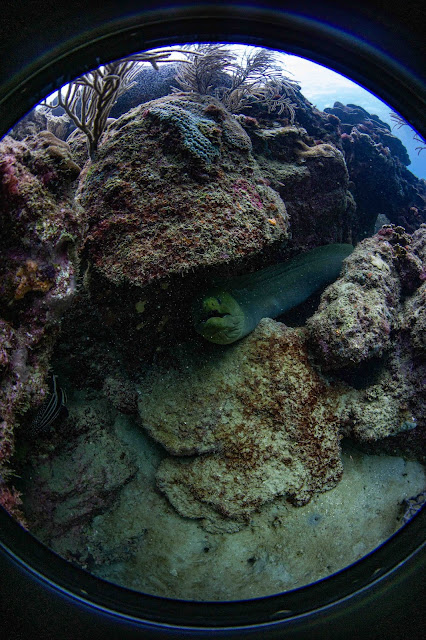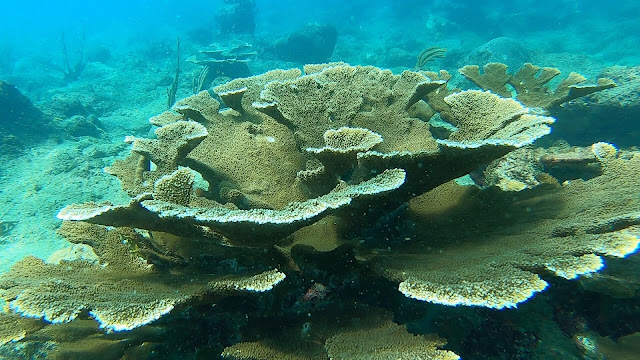Tobago Beyond Covid-19
Dr Anjani Ganase, marine scientist, talks about new developments for Tobago in the face of climate change and Covid-19.
Living
with Covid-19, what do you think is the main challenge(s) for business in
Tobago?
Businesses
in Tobago will be hard pressed to recover financial losses in the short term,
while trying to secure livelihoods in the long-term against future threats –
diseases but also threats related to climate change.
While
Tobago is the beneficiary of an oil and gas economy, its other natural resource
– rich biodiversity and island beauty - has driven a fairly passive tourism
industry.
Unfortunately,
both industries are high risk ventures as the world moves away from fossil
fuels., Small islands are also at risk they continue to be ravaged by extreme
storm events, flooding and severe water shortages.
It’s
time we started protecting our natural environment for our own benefit. If and
when, there are visitors again, they can enjoy with us.
It will
be a tough grind for our leaders who would need to strategize how to get out of
debt, while moving in a direction that would liberate us from the stronghold
and damages of oil and gas. We also have
to contend with staying relevant, as other island nations around the world are
already shifting to the green or blue economy.
Our
biggest challenge will be changing our mindset and recognising that as the
world changes we need to adapt. It will not be business as usual. Instead of
investing in physical infrastructure over and over again - ports, highways,
boats - it’s time to invest in people, our human capital. Their skills will
bring the job opportunities and economic growth.
 |
| Tobago’s green economy is its rainforests and unique island ecosystems. Photo by Anjani Ganase |
Is this
different from the challenges facing the ordinary citizens of Tobago? If
different, how so?
As an
island of 50,000 persons, the challenges will be faced on all levels, but this
also means that the ability to change is manageable. Try to imagine Tobago as a
company that is trying to revamp their island brand. This requires cohesion on
a national level and support for the community level.
What in
your opinion, is the greatest opportunity for Tobagonians after May?
The
greatest opportunity is here and now to reset and strategize Tobago’s economic
future, as a paradise for its people who can grow and learn and create
livelihoods from imagination and the natural resources. Let us aspire to a
future that would no longer be halted by a single disaster event (hurricane or
pandemic). As an island we don’t have to be restricted to tourism in the
traditional sense.
 |
| Tobago’s blue economy is its oceans and coral reefs. Photo by Anjani Ganase |
As a new
starting point, what would you like to see happening in Tobago after May?
In the
immediate short-term, Trinbagonians will need to support each other more than
ever until the international markets become available again. After May, or once
we are able to move around within our borders, we should encourage families to
seek a domestic vacation in the sister island as the affordable and safe
option. Support the local farmers and restaurant owners. All the while we
should be considering how Tobago should rebrand itself, for this conversation
needs to happen with the communities.
Long-term
investments need to be made in the following sectors:
1. Renewable energy at a small scale in the first instance to reduce the
need for subsidized use of our gas; and allow us to sell our gas elsewhere for its
true market value. Give tax breaks for renewables such as solar or wind power.
2. Alternative economic ventures must be developed to buffer tourism. Look
at sustainable aquaculture and establishing marine renewable technology. Learn
from other islanders, such as the Polynesians, who mastered sustainable
aquaculture for over a thousand years.
3. Modernise tourism to select eco-friendly, educational and research ventures.
To do this it is imperative we protect and manage our natural spaces (green and
blue) as educational and research experiences need to occur in places that are
ecologically untampered by humans. Training should occur in Marine Park management and
conservation but we also need to foster support staff for research activities – lab,
technology, boating and diving.
4. Develop programmes for education and ocean governance. In order to
benefit from our marine environments, we need to encourage marine research,
while putting in the policies for sustainable use.
What are
some of the initiatives that you would expect to be started in Tobago?
Waste
reduction, in regard to carbon emission and other waste, goes hand in hand with
Tobago’s success. The priority would be to give stimulus packages to support
green ventures in the private sector. Business – guest houses, hotels
restaurants - must be encouraged to reduce their carbon emissions by either
mapping an infrastructure that significantly reduces their carbon footprint;
for example architecture that reduces the need for air conditioning and uses
natural light; installation of small
scale renewable energy sources such as solar panels, solar heaters and sky-lighting.
Governments should support this by providing training in technical positions
and subsidising cost for importation of parts or petitioning for local
manufacturing.
A simple
example would be an island scale, sustainable plastic reduction campaign. In
the first place, to actively prevent plastic use but also to avoid overwhelming
recycling centres which are rarely sustainable. Encourage people to submit
innovative project ideas to reduce the plastic waste. Encourage individuals to
buy/ carry reusable cups, cutlery and bag sets upon arrival on the island. For instance, visitors to marine parks (as in Bonaire
) receive an annual marine park tag and eco-friendly package. This would allow
for discounted prices when used anywhere on the island that supports the
campaign but also access to certain tours in more exclusive areas. Reusable cups
can be returned at the end of the trip or kept as souvenirs.
How do
you think investments/ funding should be raised to restart Tobago?
In the
past, we have managed to source funds for construction projects that often fall
into disrepair without the skillsets to maintain. Let us now develop the
skillset to drive innovative projects. I
don’t have all the answers, but we can task our economic minds to strategise.
At the
ground level, what kinds of programmes do you expect to gain traction?
Tourism?
Non-traditional tourism, such as educational/ research tourism. – to explore
the deep ocean environments of Tobago using submersibles and technical diving training.
Round the island hiking trails with accommodation and food in communities where
the trails pass. Round the island sailing packages to train people how to sail
with stop off in bays with designated moorings.
Industry?
Shift away from monocultures that require large land spaces, and methods that devastate
our biodiversity. Encourage small businesses and homeowners to grow using
permaculture methods and maximise small spaces to grow an array of produce.
Education?
Invest in studies in renewable energy, marine research and technology, digital
technology
Sport
and entertainment? Invest in sports that allow immersive experiences with
nature – mountain bike riding, sailing, surfing, free diving, even sky diving.
Environment?
Management of protected areas and spatial planning of the land and ocean
ecosystems for conservation, recreational use, research and areas for
restoration
Social
support? Invest in health and wellness infrastructure – nature parks, retreats
for citizens but something that can be a draw for the international community
 |
| Petit Trou mangrove boardwalk is an example of innovative trails that can be put in place across Tobago. Photo by Anjani Ganase |
Describe
your vision for Tobago as a model society.
I hope Tobago would be the model for the rest
of the Caribbean and small-island states around the world to show that we can change
to deal with climate challenges, and we can change to a different economy where
people’s well-being is paramount.


